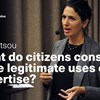topology
Still heating: Unfolding a typology of climate obstruction
In N. Marschner, C. Richter, J. Patz, & A. Salheiser (Eds.), Contested climate justice – Challenged democracy: International perspectives (pp. 59-71). Campus Verlag GmbH Abstract Earth is on a catastryet, there is little sign of halting the rise of global greenhouse gas emissions orstopping the extraction of fossil fuels. Against this background, in this articlewe re-engage with a recently proposed typology supposed to cover three modesthrough which effective climate action has been obstructed. These are, first,primary obstruction, that is, the spread of disinformation and/or denying the veryexistence of anthropogenic climate change. Second, secondary obstruction concernsmore or less deliberate obstruction via opposition to climate action and policiesvia, for example, reference to “the threat of deindustrialisation”. Finally, tertiaryobstruction denotes modes of living which, while not necessarily obstructingeffective climate change intentionally, concerns “living in denial”. Drawing onrecent research and examples, we revisit this typology.
Emergent hierarchical structures in multiadaptive games
2011. Phys. Rev. Lett. 106: 028702. We investigate a game-theoretic model of a social system where both the rules of the game and the interaction structure are shaped by the behavior of the agents. We ca
Simulated epidemics in an empirical spatiotemporal network of 50,185 sexual contacts
2011. PLoS Comp. Bio. 7(3):e1001109. doi:10.1371/journal.pcbi.1001109 Abstract Sexual contact patterns, both in their temporal and network structure, can influence the spread of sexually transmitted inf
The quality of compliance: investigating fishers’ responses towards regulation and authorities
Fish and Fisheries, Early view: doi:10.1111/faf.12197. Abstract A substantial amount of scientific effort goes into understanding and measuring compliance in fisheries. Understanding why, how and when f
Margaret Moore: Towards a theory of resource justice..?
Margaret Moore, Professor in the Political Studies department at Queen’s University. Abstract This paper is interested in developing an account of resource justice, by which I mean a theory about the en
Eri Bertsou: Varieties of Expertise: What do citizens consider to be politically legitimate uses of expertise
Venue: Institutet för framtidsstudier, Holländargatan 13, 4th floor, Stockholm, and online Research seminar with Eri Bertsou, Assistant Professor of Political Science, University of St. Gallen (HSG).REG

Eri Bertsou: What do citizens consider to be politically legitimate uses of expertise?
Can democratic politics incorporate citizen demands for independent expertise in ways that boost legitimacy and trust in politics? Democratic governments worldwide face the dilemma of how to deal with
Peter Hedström elected a member of the Royal Swedish Academy of Letters, History and Antiquities
On the 6th of May, Peter Hedström was elected a member of the Royal Swedish Academy of Letters, History and Antiquities. The Royal Swedish Academy of Letters, History and Antiquities was founded in 175
Luke Russell: What is Forgiveness?
Luke Russell, Associate Professor, Department of Philosophy, The University of Sydney. Abstract There are many contexts in which people are encouraged to forgive. Forgiveness is praised by Christians, b
From grasshoppers to human group behavior – interview with David Sumpter
On January 12th, Dagens Nyheter published an interview with David Sumpter, professor of applied mathematics. David , who is currently working at both Uppsala University and the Institute for Futures St








